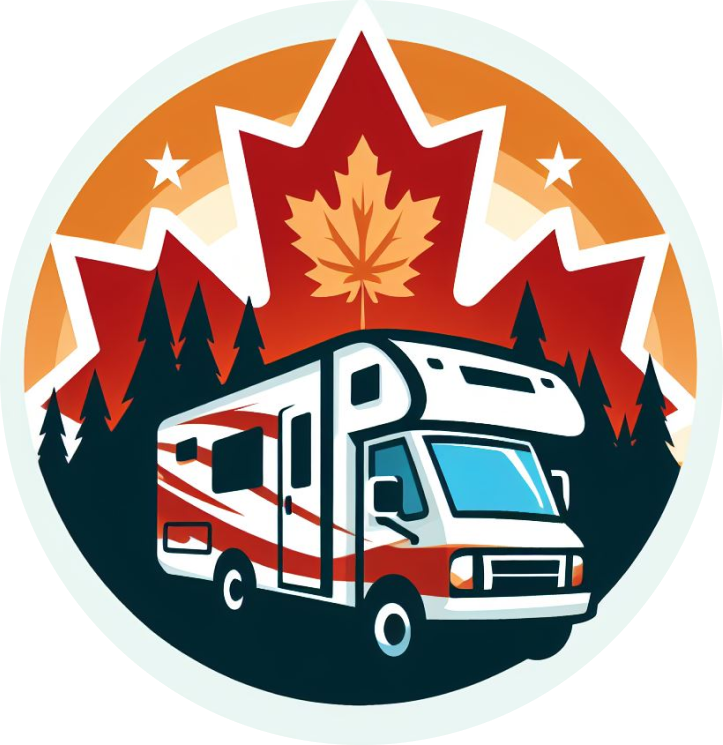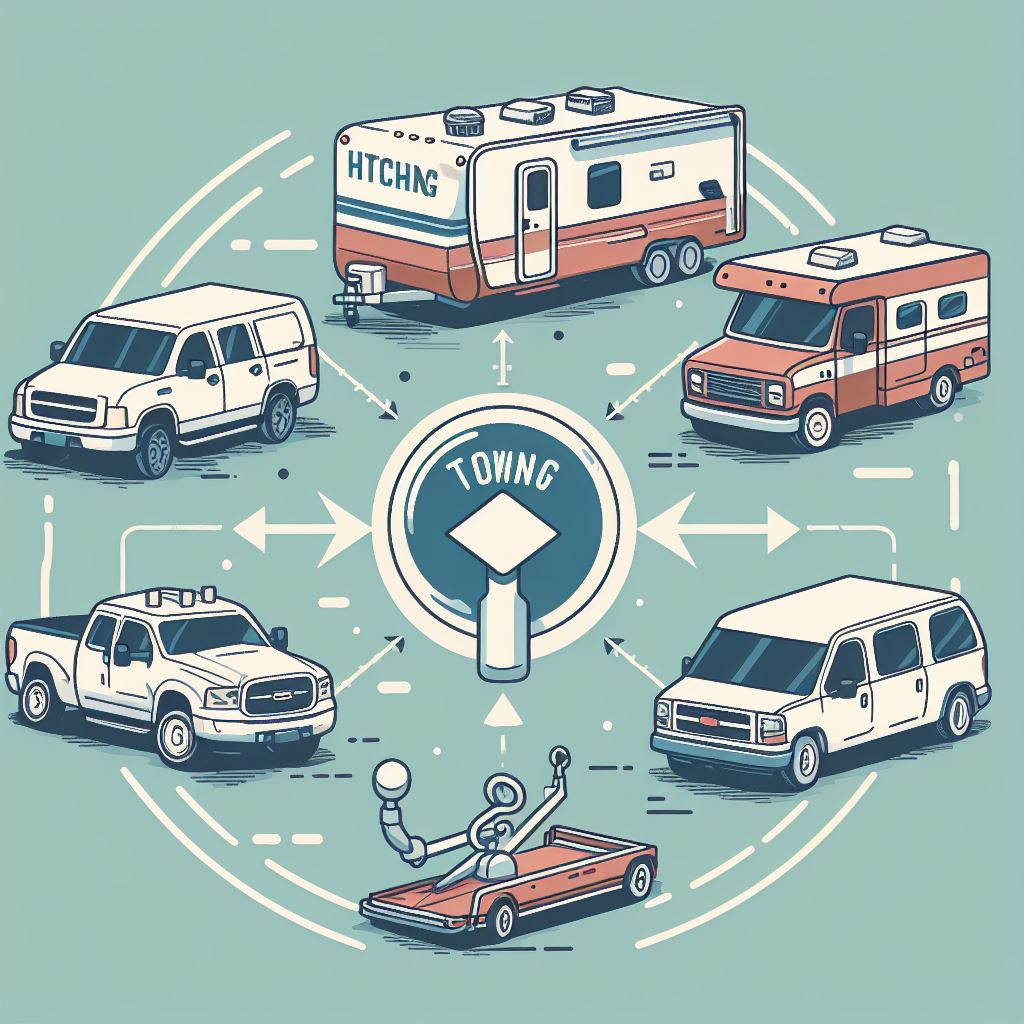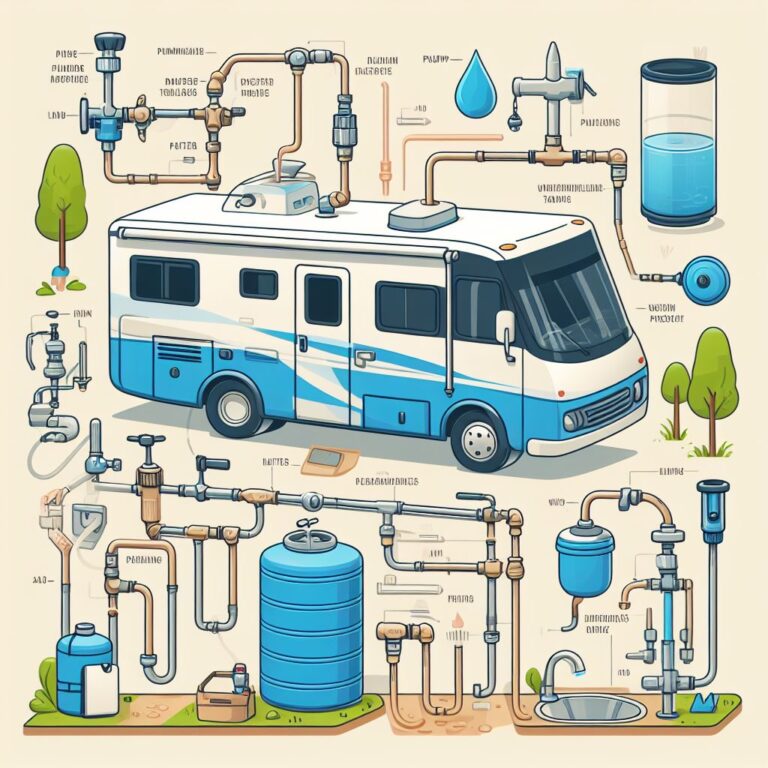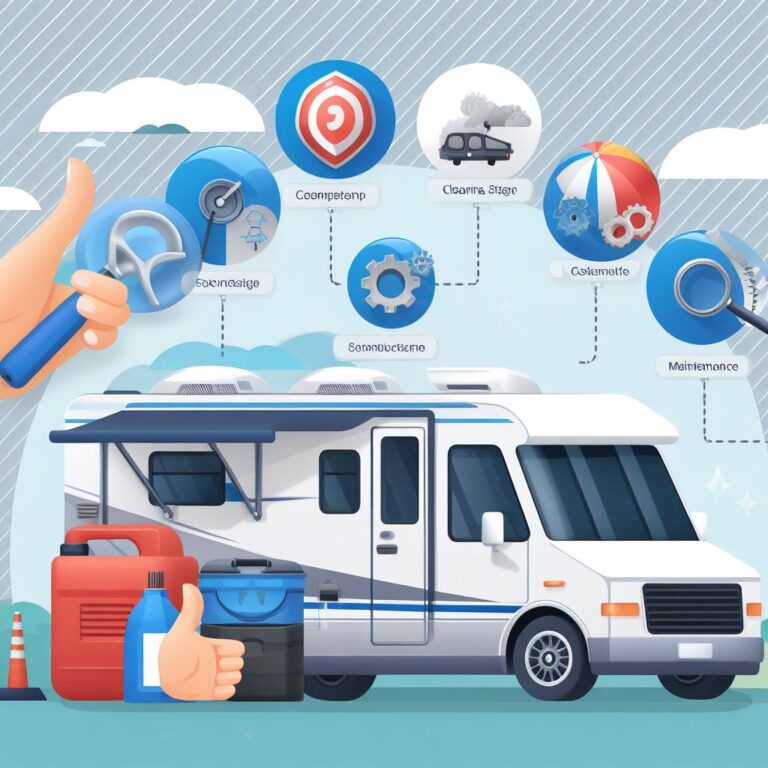How To Choose RV Hitching & Towing
Understanding Different Types of RV Hitches
When discussing hitches for Recreational Vehicles (RVs), it is essential to take into account the range of types available in the market. Each type serves a distinct purpose, usually tailored to match the RV’s size, towing requirement, and specific handling characteristics. Typically, hitches are categorized into five primary types, including receiver, fifth wheel, gooseneck, pintle, and weight-distribution, all of which vary in terms of both performance and installation complexity.
For instance, gooseneck hitches, well-known for their robust capacity, are best suited for commercial or large-scale towing purposes. On the other hand, receiver hitches, which are conveniently categorized into five different classes in terms of their towing capability, are better off with lighter and smaller vessels. Unlike the aforementioned types, fifth-wheel and pintle hitches offer increased mobility — an essential quality for bumpy roads and tight corners. Lastly, weight-distribution hitches, as the name suggests, help distribute the trailer’s weight evenly across the towing vehicle, thereby ensuring stability during travel.
Key Considerations When Selecting a Towing Vehicle
When deciding on the perfect towing vehicle for your RV, several factors should be given priority. The most crucial factor is the vehicle’s towing capacity, which should align with the weight of your RV. The vehicle’s engine capacity plays a significant role in determining this factor. High torque and horsepower are ideal for pulling heavy loads. Additionally, the type of transmission is equally important, with manual transmissions generally offering better control, especially when driving downhill.
Apart from the technical factors, comfort and convenience should not be overlooked. The vehicle should be comfortable enough to ensure enjoyable long drives. In terms of convenience, a spacious cargo area for extra storage can be a life-saver during camping trips. Safety features such as trailer sway control and stability control systems are also extremely necessary for ensuring secure RV travels. Factors like these significantly shape the overall RV towing experience.
Importance of Weight and Towing Capacity in RV Travel
The weight of your RV and its towing capacity are fundamental considerations when planning an RV trip. As the driver, you have to ensure that your RV isn’t overloaded. This is not only a matter of regulation but also concerns safety. Overloading your RV can result in poor handling, reduced fuel efficiency, increased wear and tear, and the potential for breaking down or causing an accident on the road. Hence, understanding the weight of your vehicle including items and passengers is critical.
Towing capacity, on the other hand, refers to the total amount of weight your vehicle can comfortably and safely tow. This total is not merely the weight of the trailer or vehicle being towed, but also includes the weight of any fuel, water, cargo, or passengers inside. Going beyond your vehicle’s safe towing capacity can lead to serious issues, including transmission problems, brake failure, or even a blowout. It also affects your insurance coverage and liability in the event of an accident. Therefore, knowing your RV weight and towing capacity is the first step towards a safe and successful journey.
Understanding Trailer Tongue Weight
In the realm of RV towing, the term “trailer tongue weight” is frequently thrown around. It is a fundamental weight measurement, defined as the force exerted by the trailer’s tongue on the tow vehicle’s hitch when the trailer is entirely leveled. It is crucial to maintain a proper balance as too much or too little weight can considerably affect the stability and performance of your vehicle.
Generally, the tongue weight should equate to about 10%-15% of the trailer’s gross weight. In other words, if a trailer weighs 5,000 pounds, the tongue weight should ideally fall within the range of 500 to 750 pounds. Ensuring an appropriate tongue weight not only heightens the ease of ride but also prevents dangerous situations like trailer sway or difficulty steering, thereby ensuring a safer RV towing journey.
Factors Determining the Right Hitch for Your RV
When embarking on the task of selecting the right hitch for your RV, there will be numerous elements and considerations simultaneously vying for your attention. Primarily, know that the model and make of the recreational vehicle, as well as its gross trailer weight (GTW), are vital factors to consider. Both these aspects determine the kind of hitch suitable for your vehicle. The GTW refers to the total weight of the trailer along with its contents when fully loaded, and it’s imperative to adhere strictly to the GTW because overloading can cause serious accidents.
Furthermore, the trailer tongue weight (TW) also plays a significant role in determining the right hitch. The TW involves allocating 10%-15% of your GTW as the weight at the tongue. In simpler terms, if your trailer weighs 10,000 pounds fully loaded, then your tongue weight should be 1,000 to 1,500 pounds. Also, the towing capacity of the vehicle that will be towing the RV is instrumental in choosing the right hitch. Equally important are the hitch classes which are broken down by weight capacity and opening size. It allows you to decide for certain if the equipment fits onto your already-existing hitch receiver.
The Role of Hitch Classes in RV Towing
Hitch classes play a pivotal role in RV towing. They provide a clear classification based on the weight they can safely tow, their design, and their compatibility with different types of vehicles. These classes range from Class I, suitable for compact cars and meant for light-duty hauling where the gross trailer weight (GTW) is no more than 2000 pounds, all the way up to Class V, which is designed for heavy-duty towing with pickup trucks and can handle a GTW up to a whopping 18,000 pounds.
Understanding the role of hitch classes is crucial to ensuring safety and reliability while towing. It is essential to match the weight and size of your RV to an appropriate hitch class. Ensuring that your hitch class is correctly matched not only guarantees an efficient towing experience but it also minimizes the risk of damaging your vehicle or the RV, and increases your safety on the road. It’s always vital to remember that exceeding a hitch’s weight limit can lead to dangerous towing conditions. So, hitch classes are not mere numbers; they play an integral part in a safe RV towing experience.
Safe and Secure Towing: Importance of Hitch Installation
Ensuring your RV hitch is correctly installed is paramount to both secure and safe towing. A correctly fitted hitch not only provides a firm connection between your towing vehicle and trailer but also helps evenly distribute the load weight. It aids in maintaining vehicle stability, thereby enhancing handling and preventing unpredictable movements during transit. Therefore, poor hitch installation is not an area to be overlooked, as it could potentially result in disastrous consequences such as trailer sway, difficulty in maneuvering, and even detachment whilst on the road.
In addition, factors like the hitch type, its compatibility with your towing vehicle and trailer, as well as the towing capacity, contribute to a successful and safe RV towing experience. Besides selecting the right hitch, hiring a professional for the installation can be of great benefit. They can not only ensure safe and correct placement but also help in avoiding any probable damages to the towing vehicle or trailer due to an erroneous setup. Thus, prioritizing hitch installation goes a long way in ensuring a safe and worry-free RV adventure.
Troubleshooting Common Issues with RV Hitches
When it comes to RV towing, issues with the hitch can pose significant challenges. Among the most common problems are issues with the hitch receiver where it becomes loose or makes abnormal noise during the journey. These issues often indicate a need for immediate attention or repair. Additionally, users might face issues with locking the hitch properly, which can be traced back to a faulty locking mechanism, the trailer not being levelled, or the tow vehicle hitch receiver’s height not aligning with the hitch ball.
Such problems, if not addressed promptly, could lead to more severe malfunctions and even safety concerns. It is, therefore, essential to stock up on knowledge about basic troubleshooting solutions. Regular inspection of the hitch can help identify any visible damages, while being mindful of unusual noises can help detect hidden problems. For stubborn issues or those that continually recur, it may be wise to seek professional help or replace the faulty parts. It’s always better to be safe than sorry when it comes to ensuring a smooth RV travel experience.
The Impact of Weather and Terrain on RV Towing
RV towing can be significantly influenced by weather conditions and terrain. Sudden downpours, icy roads, high winds and temperature extremes can compromise your vehicle handling, impacting overall towing capabilities. Additionally, harsh climate conditions can put undue stress on your hitch connection and your RV, possibly causing mechanical issues or reducing its lifespan. Therefore, it’s imperative to be cognizant of the potential impact of diverse weather conditions and plan your trip accordingly to ensure safety and ease of travel.
Equally, the terrain is a critical factor to consider when towing an RV. The hitch’s effectiveness and the towing vehicle’s ability can both be significantly impeded by steeps, uneven roads, and precarious slopes. For instance, rocky terrains can put a strain on your towing setup, leading to more wear and tear. Meanwhile, uphill drives exert extra pressure on the vehicle’s engine and the RV hitch, potentially increasing fuel consumption. In essence, understanding and preparing for the impact of both weather and terrain on RV towing is fundamental for a smooth and secure journey.
Maintaining Your RV Hitch: Tips and Tricks
Regular maintenance of your RV hitch can greatly increase its longevity, as well as ensure smooth and hassle-free towing. An integral part of any RV adventure, a well-maintained hitch can make all the difference between a seamless journey or a trip fraught with issues. Just as one would routinely service the RV itself, the hitch too requires regular attention. Negligence can not only cause damage but also compromise safety, making it essential to upkeep the hitch with periodic checks and cleaning.
In terms of physical maintenance, one must always ensure that the hitch is clean and free from dust and grime. Dirt can cause rusting and affect the moving parts of a hitch. Therefore, regular cleaning and applying appropriate lubrication to the hitch ball and other moving parts is recommended. Similarly, inspecting the hitch for any physical damage like cracks or bends is important. If any such issues are found, it is advised to consult a professional for repair or replacement. Regular inspection, cleaning, and lubrication are simple yet effective steps in maintaining the health and efficiency of your RV hitch.
What are the different types of RV hitches?
There are various types of RV hitches, including weight-distributing hitches, gooseneck hitches, fifth-wheel hitches, and receiver hitches. Each type has its advantages and is suitable for specific types of vehicles and towing needs.
What should I consider when selecting a towing vehicle?
When choosing a towing vehicle, consider the vehicle’s towing capacity, fuel efficiency, transmission type, and the type of hitch it can accommodate. The vehicle should be capable of handling the weight of your RV and the contents you plan to carry.
How important is weight and towing capacity in RV travel?
Weight and towing capacity are critical factors in RV travel. Overloading your RV or towing vehicle can lead to poor performance, increased fuel consumption, and potential damage. It’s important to understand the weight limits of your vehicle and hitch system to ensure safe and efficient travel.
Can you explain what trailer tongue weight is?
Trailer tongue weight is the downward force that the trailer tongue exerts on the hitch of the towing vehicle. Understanding and correctly managing this weight is crucial for safe and stable towing.
How do I decide the right hitch for my RV?
The type of hitch suitable for your RV depends on various factors like the weight of your RV, the towing vehicle’s capabilities, the type of travel you plan to do, and the hitch class compatible with your vehicle.
What is the role of hitch classes in RV towing?
Hitch classes refer to the rating system that indicates the maximum amount of weight a hitch can handle. They play a crucial role in RV towing as they help ensure you choose a suitable hitch that can safely support the weight of your trailer.
How important is the installation of the hitch?
Proper installation of the hitch is vital for safe and secure towing. A poorly installed hitch can lead to accidents and damage to both the vehicle and the RV. It’s advisable to get your hitch professionally installed and regularly checked for any issues.
What are some common issues with RV hitches?
Common issues with RV hitches include inappropriate hitch height, wrong hitch class, incorrect weight distribution, and loose connections. Regular inspection and maintenance can help mitigate these issues.
How does weather and terrain impact RV towing?
Weather conditions and terrain can significantly impact RV towing. Wet or icy roads, high winds, and steep inclines can all affect the stability and safety of your towing setup. It’s important to adjust your driving accordingly and ensure your hitch system is properly maintained for different conditions.
How can I maintain my RV hitch?
Maintaining your RV hitch involves regular inspection for any visible signs of wear, corrosion, or damage. Ensure the hitch is properly lubricated and all connections are tight. If you notice anything unusual, consult a professional for repairs or replacements.
- How To Choose TIPHOPE RV Accessories - February 10, 2024
- How To Choose Joinfworld RV Accessories - February 10, 2024
- How To Choose Conntek RV Accessories - February 9, 2024







